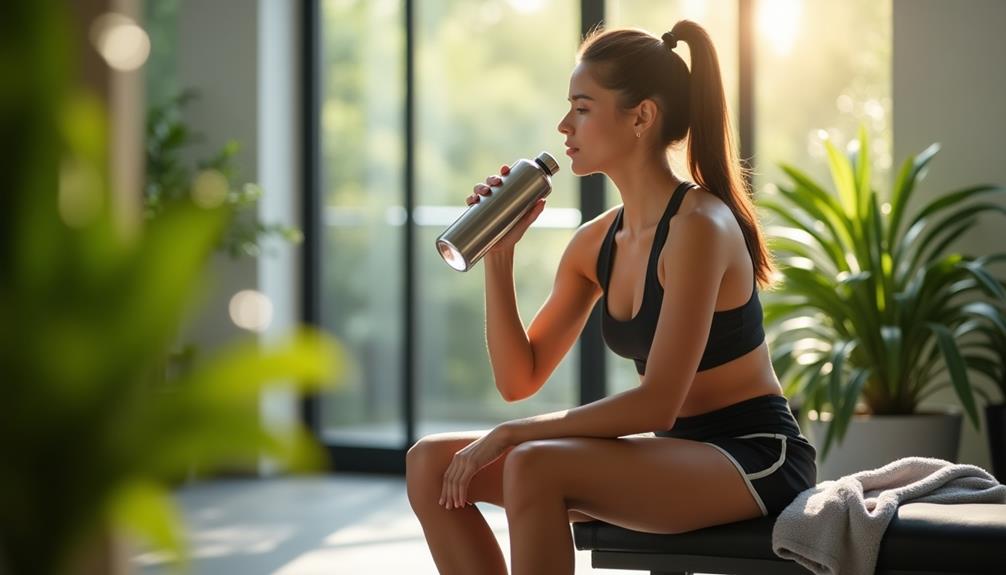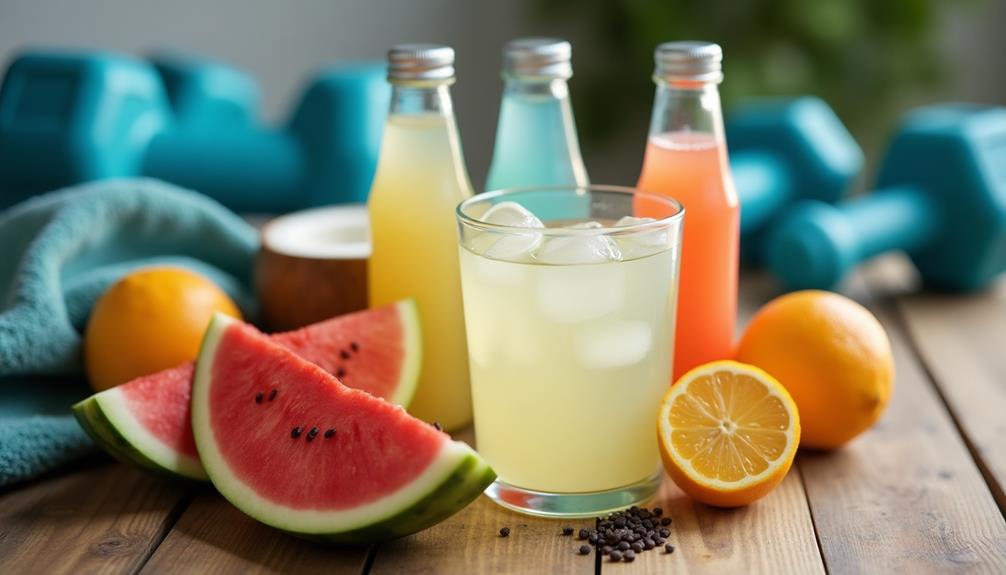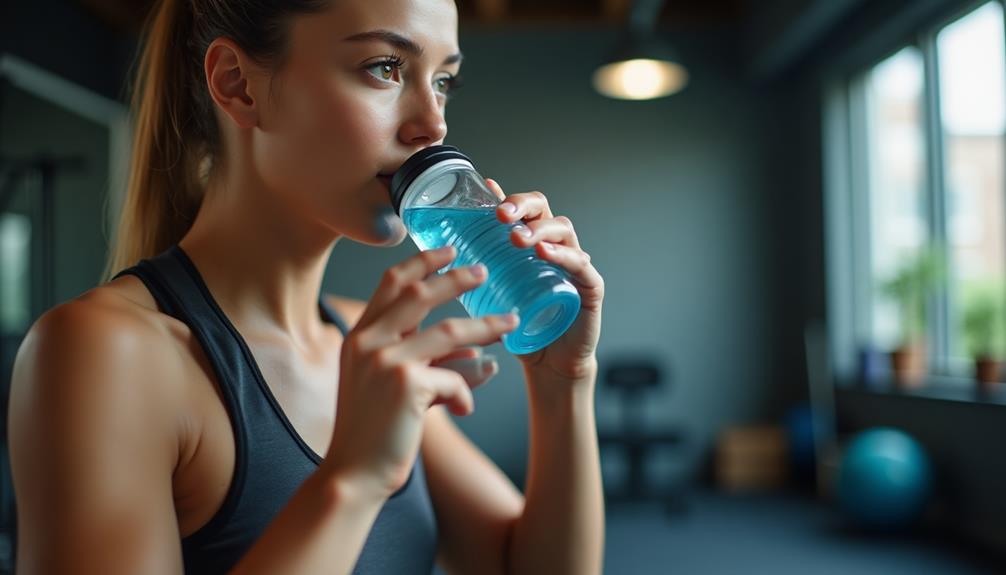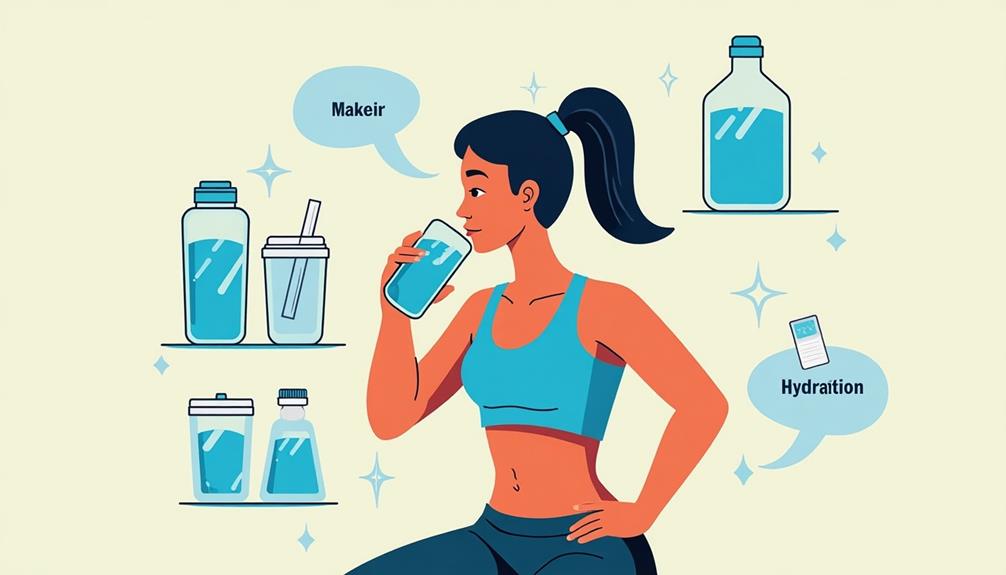You can't underestimate the role of hydration in boosting your muscle recovery after workouts. Start by drinking at least 16 ounces of water an hour before exercising, then sip 7-10 ounces every 10-20 minutes during your session. Right after your workout, replenish with 16-20 ounces of water or a sports drink for lost electrolytes. For ideal recovery, consider sources like coconut water or electrolyte tablets. Remember, your hydration needs vary based on your activity level and climate, so listen to your body. Stay tuned to discover more about effective hydration practices and how they can support your recovery.
Core Insights
- Start your hydration strategy by drinking at least 16 ounces of water an hour before workouts to ensure optimal hydration levels.
- During exercise, aim to sip 7-10 ounces of water every 10-20 minutes to maintain fluid balance and prevent dehydration.
- After workouts, replenish lost fluids with 16-20 ounces of water or coconut water within 30 minutes for effective recovery.
- Incorporate electrolyte-rich foods or drinks post-exercise to restore essential minerals like sodium and potassium lost through sweat.
- Monitor your body's signals and adjust hydration based on activity level, climate, and personal needs for better recovery outcomes.
Importance of Hydration for Recovery

Hydration plays a key role in muscle recovery, and you should prioritize it after any intense workout. When you exercise, your body loses fluids through sweat, which can lead to dehydration. This loss affects your muscles' ability to recover effectively. Proper hydration helps transport nutrients to your muscles, reduces muscle soreness, and supports overall recovery. Coconut water brands can be an excellent source of natural electrolytes, providing optimal hydration and supporting muscle recovery. These products often contain high levels of potassium, which is essential for maintaining proper fluid balance in your body.
Additionally, staying hydrated helps maintain your body's temperature and supports joint lubrication. It's crucial to drink fluids before, during, and after your workout to keep your hydration levels optimal. You'll notice improved performance in your next workout and a quicker recovery period. So, make hydration a key part of your post-exercise routine, and your muscles will thank you for it as they rebuild and strengthen.
Types of Hydration Sources

When you think about rehydrating after a workout, consider the various sources available to replenish lost fluids and electrolytes. Here's a quick overview of some effective hydration options:
| Hydration Source | Benefits | Best For |
|---|---|---|
| Water | Calorie-free, easily accessible | Everyday hydration |
| Sports Drinks | Electrolytes, quick energy | Intense workouts |
| Coconut Water | Natural electrolytes, low in sugar | Post-exercise recovery |
| Electrolyte Tablets | Convenient, customizable | On-the-go hydration |
Using a mix of these sources can help you stay hydrated and enhance muscle recovery. Experiment with what works best for you, and keep your hydration levels in check to support optimal recovery.
Timing Your Hydration

- Before Your Workout: Drink water to make sure you start your session fully hydrated. Aim for at least 16 ounces about an hour before exercising. For peak performance, consider incorporating hydration powders into your pre-workout routine, as they can enhance electrolyte balance and improve overall hydration.
- During Your Workout: Sip water regularly to maintain hydration levels. Aim for 7-10 ounces every 10-20 minutes, especially during intense sessions.
- After Your Workout: Replenish lost fluids immediately post-exercise. Consume at least 16-20 ounces within 30 minutes to kickstart recovery.
Electrolytes and Muscle Function

Electrolytes play an essential role in muscle function, especially during and after workouts. These minerals, including sodium, potassium, magnesium, and calcium, help maintain fluid balance in your body, which is vital for peak muscle performance. When you sweat, you lose these electrolytes, which can lead to cramping, fatigue, and decreased strength. Fast-acting carbohydrates can also aid in replenishing glycogen stores and supporting overall recovery when combined with electrolyte intake.
To support your muscle recovery, consider replenishing electrolytes post-exercise. Sports drinks or electrolyte-rich foods like bananas, avocados, and leafy greens can help restore what you've lost. It's also important to listen to your body; if you're feeling sluggish, it might be a sign you need more electrolytes. By keeping your electrolyte levels balanced, you'll enhance your muscle function and recovery, setting yourself up for success in your next workout.
Hydration Myths Debunked

- You need eight glasses of water daily: Your hydration needs depend on various factors like activity level, climate, and diet.
- Sports drinks are always better than water: While they help replenish electrolytes, they're often high in sugar. Water is usually sufficient for most activities.
- You can't drink too much water: Overhydration is possible and can lead to serious health issues, including hyponatremia.
Understanding these myths can help you develop better hydration habits for muscle recovery. Focus on your unique needs, and listen to your body.
Frequently Asked Questions
How Much Water Should I Drink Daily for Optimal Recovery?
Picture a vibrant garden thriving under the sun. For best recovery, you should aim for about half your body weight in ounces of water daily. Listen to your body; adjust based on activity levels and climate.
Can Caffeine Affect My Hydration Levels During Recovery?
Caffeine can impact your hydration levels by acting as a diuretic, leading to increased urine production. However, moderate consumption usually won't greatly affect your overall hydration, especially if you're drinking enough water throughout the day.
Is It Better to Hydrate Before or After Exercise?
Isn't it essential to stay hydrated throughout your workout? Hydrating before exercise prepares your body, while post-exercise hydration helps recovery. Aim to drink water both before and after to maximize your performance and recovery.
Are There Specific Drinks to Avoid for Muscle Recovery?
You should avoid sugary drinks and alcohol after workouts. They can hinder your recovery by causing dehydration and slowing down muscle repair. Stick to water or electrolyte-rich beverages to support your recovery effectively.
How Do Temperature and Humidity Impact Hydration Needs?
When it's hot and humid, you sweat more, so your hydration needs increase. You should drink more water or electrolyte-rich fluids. Staying aware of these conditions helps you maintain peak hydration and overall performance.

